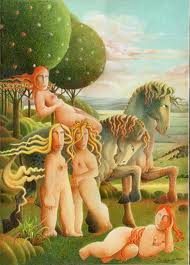Amazons 2#: ‘They’ll Kill You’ April 22, 2013
Author: Beach Combing | in : Modern , trackbackThe women warriors of the Amazon basin appear for the first time in a European account in 1542 when Gaspar de Carvajal, a friar on the expedition of Francisco de Orellana was passing down the river that would soon be named for them. Beach has already described an earlier Indian description of these women from Carvajal’s pages. Here then is the second of four instances when these Amazons appear in Gaspar’s account.
When the Captain saw the gentle restraint of the [Indian] lord he discoursed with him. He explained that we were Christians and that we worshipped one God, who was the creator of all living things, and that we were not like [the Indians] who went and adored stones and built up piles (bultos?), and on this he said much else. He also told them how we were subjects and vassals of the Emperor of the Christians, the great king of Spain, and that our lord was called Don Carlos and that he reigns over all the Indies and many other territories and kingdoms in all the world. Further, he said it was for Carlos that we had gone to these lands, and that we were to set out what we had seen there [?íbamos a dar razón de lo que habíamos visto en ella]. The natives were very attentive and listened carefully to everything our captain said. They told us that if we went to see the Amazons, that in their language they call coniu puyara, meaning ‘Great Ladies’, that we should be careful as we were few and they were many. These women would kill us so we would not be on their land and they said that they [the natives I presume?] would give us all we needed. The captain explained that the Amazons [?] would have to stay away [from us], on account of he who had sent him, namely his king and lord [i.e. Carlos]
Viendo el capitán el buen comedimiento del señor, le hizo un razonamiento dándole a entender cómo éramos cristianos y adorábamos un sólo Dios, el cual era creador de todas las cosas criadas, y que no éramos como ellos, que andaban errados adorando en piedras y bultos hechos, y sobre este caso les dijo otras muchas cosas, y también les dijo cómo éramos criados y vasallos del Emperador de los cristianos, gran rey de España, y se llamaba don Carlos nuestro señor, cuyo es el imperio de todas las Indias y otros muchos señoríos y reinos que hay en el mundo, y que por su mandado íbamos a aquella tierra, y que le íbamos a dar razón de lo que habíamos visto en ella. Y estaban muy atentos y con mucha atención escuchando lo que el capitán decía, y le dijeron que si íbamos a ver las amazonas, que en su lengua las llaman coniu puyara, que quieren decir grandes señoras, que mirásemos lo que hacíamos, que éramos pocos y ellas muchas, que nos matarían, que no estuviésemos en su tierra, que allí nos darían todo lo que hubiésemos menester. El capitán le dijo que no podían hacer otra cosa sino pasar de largo para dar razón a quien le enviaba, que era su rey y señor.
It seems to have been Francisco de Orellana’s reference to Carlos that got the Indians onto the subject of the Amazons: or was it perhaps, instead, the discussion of divinity? The Amazons, in the work of Gaspar and later writers, are caught hopelessly between fact and legend. If this passage and the one before was all, then, it would be easiest to veer towards legends. However, the third instance of Amazons in Gaspar’s text involves an Amazon village and the fourth a battle with the Amazons… Watch this space.
BTW any Amerindian linguists able to help with coniu puyara? drbeachcombing AT yahoo DOT com



